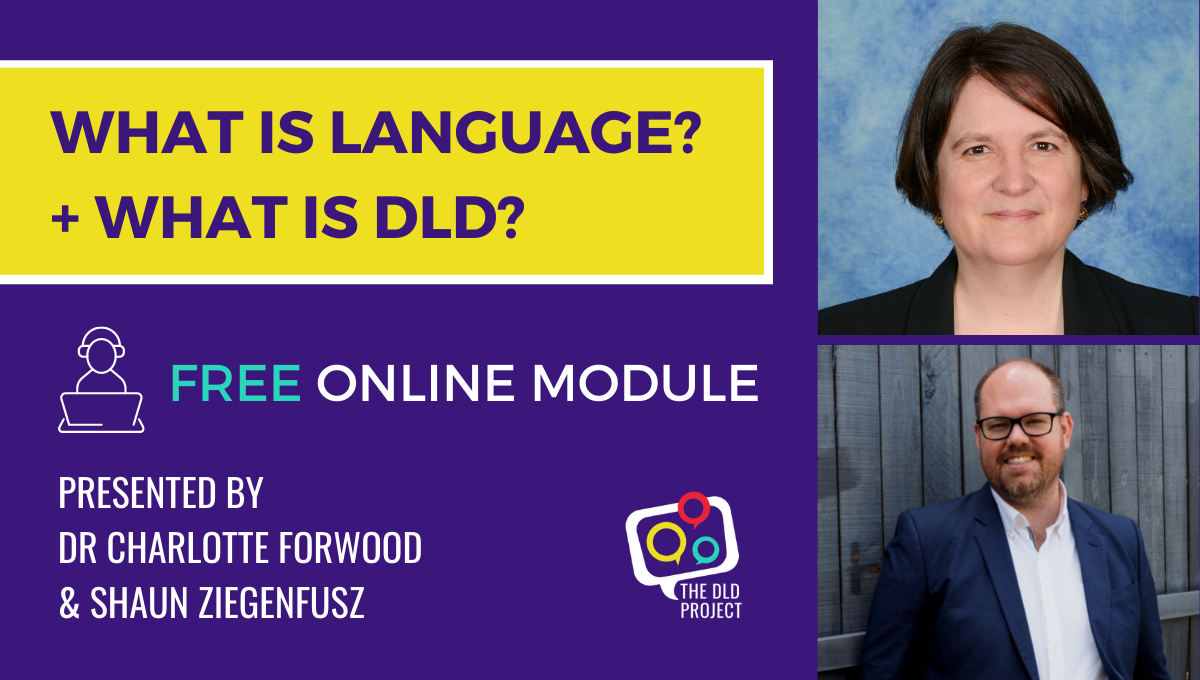Course Information
The What is Language? What is DLD? course has been created to give teachers and families a brief overview of language and Developmental Language Disorder (DLD). It provides a starting point for conversations and more in depth exploration of language and DLD, a hidden but common disability that affects two children in the average classroom of 30 students.
The course starts by offering a snapshot of language and a window into the complexities of communication. It concludes with an overview of DLD, how to identify students with DLD in the classroom and supports that can be put in place to help students with DLD to learn.
The course should take between 1 – 3 hours to complete, depending on whether or not participants engage with the optional recommended readings, podcasts and videos. It has been designed to be self-paced so there is no set timeframe for completion. Participants will receive a certificate of completion once all compulsory elements of the course have been completed.
Course Instructors
DR CHARLOTTE FORWOOD – WHAT IS LANGUAGE?
Charlotte Forwood is a registered Teacher and Certified Practising Speech Pathologist working in both the primary and secondary school settings.
Charlotte has had a varied career path encompassing teaching roles, speech pathology practice, educational publishing and consulting. She has worked in government, independent and specialist schools in Australia and the UK. She is the co-designer of ISV’s Middle Years Language Consultancy Program and the Secondary Students Language Consultancy Program and the author of the award winning STEM Investigations resource for Year 3 – 6 students.
Charlotte has a particular interest in vocabulary development (the focus of her PhD thesis), language and literacy skills in primary/adolescence, the science of learning and the language associated with metacognition. She also enjoys tinkering with tech and opportunities for collaboration with individuals and organisations beyond the classroom.
Charlotte is currently a global ambassador for Raising Awareness of Developmental Language Disorder (RADLD), coordinator of the Eastern Melbourne branch of Think Forward Educators, co-coordinator of the Boroondara Gifted Network and a designer for The DLD Project.
SHAUN ZIEGENFUSZ – WHAT IS DLD?
Shaun Ziegenfusz is a speech pathologist, and researcher with more than 10 years experience working with people with DLD and their families. He currently works in private practice and collaboratively with schools to provide assessment and intervention pathways.
Shaun is also a Doctor of Philosophy (PhD) candidate at Griffith University where he researches the needs and necessary supports for school-aged students with DLD from the perspective of key stakeholders, as well as being a volunteer member of the Raising Awareness of Developmental Language Disorder (RADLD) International Committee.
Additionally, Shaun regularly lectures at a number of Australian universities to support future speech pathologists to grow their knowledge.
Shaun is passionate about blending clinical experience and research to support students, families, professionals and schools.


This is a very informative and easy to follow course. Thank you so much for providing this learning and I will be recommending it to my colleagues.
I completed the course today , it was very informative and practical but I have no certificate at the end I am a bit confused do I have to do the modules again it had a tick at the end of each focus area. cheers Vicki
Thank you for allowing free access to these fabulous resources. The readings, quizzes, visuals and videos were very informative and relevant to my workplace (school setting).
Amazing resource, I will take so much out of this and apply to my general practice as well as supporting the learning needs of specific students. I have recommended this to some of my colleagues!
Hi Vicki, Unfortunately, we had a bug in our online learning platform which has now been fixed. You should now have your certificate. Please email us at connect@thedldproject.com if you have any further challenges. Many thanks, The DLD Project team.
Thank you for offering free access to this informative and very useful course. It has given me a better understanding of DLD and will use tips/strategies to support my practice.
Thanks for this great resource. This has provided me with a sound understanding of DLD and how I can better prepare for the coming year.
Hi Guys,
I am both an educator (ESO) and a parent/carer, which way do you recommend I enrol?
Hi Tiffany,
Which ever you think might best help access future information. If you’d like to keep updated on our education information, resources and training then it might be best to go with that first, as we’re still developing our parent/carer materials.
Kind regards, Shaun
Thank you for enrolling me. I am looking forward to learn more.